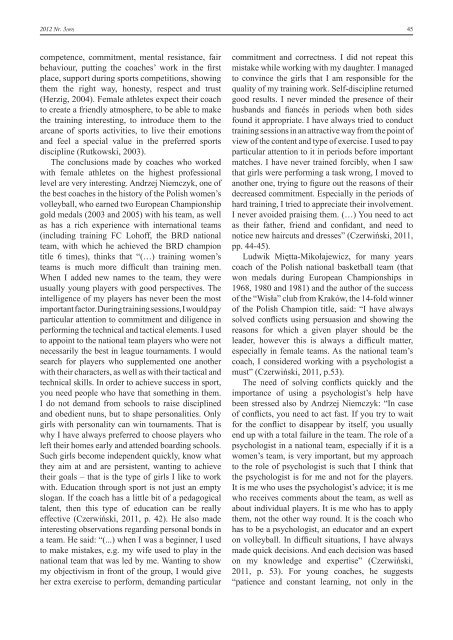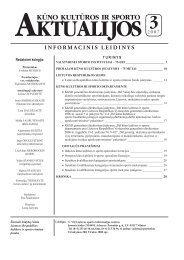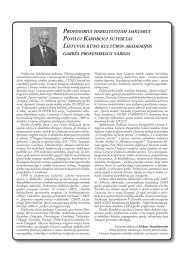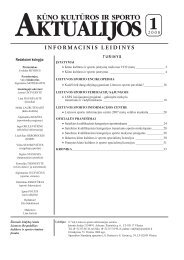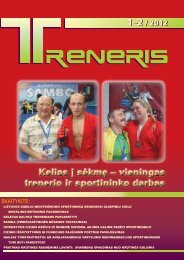Nr. 3 - Lietuvos sporto informacijos centras
Nr. 3 - Lietuvos sporto informacijos centras
Nr. 3 - Lietuvos sporto informacijos centras
You also want an ePaper? Increase the reach of your titles
YUMPU automatically turns print PDFs into web optimized ePapers that Google loves.
2012 <strong>Nr</strong>. 3(69)<br />
45<br />
competence, commitment, mental resistance, fair<br />
behaviour, putting the coaches’ work in the first<br />
place, support during sports competitions, showing<br />
them the right way, honesty, respect and trust<br />
(Herzig, 2004). Female athletes expect their coach<br />
to create a friendly atmosphere, to be able to make<br />
the training interesting, to introduce them to the<br />
arcane of sports activities, to live their emotions<br />
and feel a special value in the preferred sports<br />
discipline (Rutkowski, 2003).<br />
The conclusions made by coaches who worked<br />
with female athletes on the highest professional<br />
level are very interesting. Andrzej Niemczyk, one of<br />
the best coaches in the history of the Polish women’s<br />
volleyball, who earned two European Championship<br />
gold medals (2003 and 2005) with his team, as well<br />
as has a rich experience with international teams<br />
(including training FC Lohoff, the BRD national<br />
team, with which he achieved the BRD champion<br />
title 6 times), thinks that “(…) training women’s<br />
teams is much more difficult than training men.<br />
When I added new names to the team, they were<br />
usually young players with good perspectives. The<br />
intelligence of my players has never been the most<br />
important factor. During training sessions, I would pay<br />
particular attention to commitment and diligence in<br />
performing the technical and tactical elements. I used<br />
to appoint to the national team players who were not<br />
necessarily the best in league tournaments. I would<br />
search for players who supplemented one another<br />
with their characters, as well as with their tactical and<br />
technical skills. In order to achieve success in sport,<br />
you need people who have that something in them.<br />
I do not demand from schools to raise disciplined<br />
and obedient nuns, but to shape personalities. Only<br />
girls with personality can win tournaments. That is<br />
why I have always preferred to choose players who<br />
left their homes early and attended boarding schools.<br />
Such girls become independent quickly, know what<br />
they aim at and are persistent, wanting to achieve<br />
their goals – that is the type of girls I like to work<br />
with. Education through sport is not just an empty<br />
slogan. If the coach has a little bit of a pedagogical<br />
talent, then this type of education can be really<br />
effective (Czerwiński, 2011, p. 42). He also made<br />
interesting observations regarding personal bonds in<br />
a team. He said: “(...) when I was a beginner, I used<br />
to make mistakes, e.g. my wife used to play in the<br />
national team that was led by me. Wanting to show<br />
my objectivism in front of the group, I would give<br />
her extra exercise to perform, demanding particular<br />
commitment and correctness. I did not repeat this<br />
mistake while working with my daughter. I managed<br />
to convince the girls that I am responsible for the<br />
quality of my training work. Self-discipline returned<br />
good results. I never minded the presence of their<br />
husbands and fiancés in periods when both sides<br />
found it appropriate. I have always tried to conduct<br />
training sessions in an attractive way from the point of<br />
view of the content and type of exercise. I used to pay<br />
particular attention to it in periods before important<br />
matches. I have never trained forcibly, when I saw<br />
that girls were performing a task wrong, I moved to<br />
another one, trying to figure out the reasons of their<br />
decreased commitment. Especially in the periods of<br />
hard training, I tried to appreciate their involvement.<br />
I never avoided praising them. (…) You need to act<br />
as their father, friend and confidant, and need to<br />
notice new haircuts and dresses” (Czerwiński, 2011,<br />
pp. 44-45).<br />
Ludwik Miętta-Mikołajewicz, for many years<br />
coach of the Polish national basketball team (that<br />
won medals during European Championships in<br />
1968, 1980 and 1981) and the author of the success<br />
of the “Wisła” club from Kraków, the 14-fold winner<br />
of the Polish Champion title, said: “I have always<br />
solved conflicts using persuasion and showing the<br />
reasons for which a given player should be the<br />
leader, however this is always a difficult matter,<br />
especially in female teams. As the national team’s<br />
coach, I considered working with a psychologist a<br />
must” (Czerwiński, 2011, p.53).<br />
The need of solving conflicts quickly and the<br />
importance of using a psychologist’s help have<br />
been stressed also by Andrzej Niemczyk: “In case<br />
of conflicts, you need to act fast. If you try to wait<br />
for the conflict to disappear by itself, you usually<br />
end up with a total failure in the team. The role of a<br />
psychologist in a national team, especially if it is a<br />
women’s team, is very important, but my approach<br />
to the role of psychologist is such that I think that<br />
the psychologist is for me and not for the players.<br />
It is me who uses the psychologist’s advice; it is me<br />
who receives comments about the team, as well as<br />
about individual players. It is me who has to apply<br />
them, not the other way round. It is the coach who<br />
has to be a psychologist, an educator and an expert<br />
on volleyball. In difficult situations, I have always<br />
made quick decisions. And each decision was based<br />
on my knowledge and expertise” (Czerwiński,<br />
2011, p. 53). For young coaches, he suggests<br />
“patience and constant learning, not only in the


